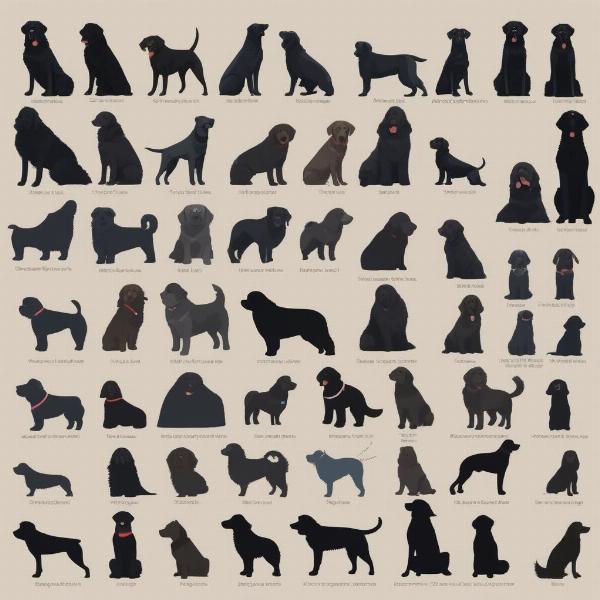Black-coated dogs exude a certain mystique and elegance. Whether you’re drawn to their sleek appearance or simply admire the loyal companionship they offer, understanding the specific needs of black dog breeds is crucial for responsible pet ownership. This guide delves into the world of black dog breeds, addressing key aspects of their care, from choosing the right breed to ensuring their long-term health and happiness. We’ll explore common misconceptions, address unique challenges, and provide practical advice for creating a fulfilling life for your black-coated companion.
Unveiling the Mystique: Popular Black Dog Breeds
From the compact and playful Black Labrador Retriever to the regal and imposing Great Dane, a wide variety of dog breeds boast stunning black coats. Understanding the characteristics and temperaments of these breeds is essential in making an informed decision. Are you looking for a devoted family dog? A vigilant watchdog? An energetic running partner? Consider breeds like the Black Russian Terrier, the Doberman Pinscher, or the sleek Italian Greyhound. Each breed comes with its own unique personality and exercise requirements.
 Variety of Black Dog Breeds
Variety of Black Dog Breeds
Addressing the Black Dog Syndrome: Fact or Fiction?
The “Black Dog Syndrome” suggests that black dogs are less likely to be adopted than lighter-coated counterparts. While some shelters have observed this trend, there’s no scientific evidence to support a universal bias. However, understanding this perception can help prospective owners advocate for these wonderful dogs and find the perfect black-coated companion waiting for their forever home.
Specialized Care for Black Dogs: Coat Health and Sun Sensitivity
Black fur absorbs more sunlight than lighter colors, making black dogs more susceptible to heatstroke and sunburn. Providing adequate shade and limiting exercise during the hottest parts of the day is crucial. Regular grooming is also important for maintaining a healthy, shiny black coat. Specific shampoos and conditioners formulated for black coats can help prevent fading and enhance their natural luster.
Nutrition and Exercise: Tailoring to Your Black Dog’s Needs
Just like any other dog, black-coated breeds require a balanced diet and regular exercise to thrive. The specific nutritional requirements and exercise levels will vary depending on the breed and individual dog. Consult with your veterinarian to determine the optimal diet and exercise regimen for your furry friend. Factors like age, size, and activity level should be considered.
Training and Socialization: Building a Well-Rounded Companion
Early socialization and training are vital for all dogs, regardless of coat color. Exposing your black dog to various sights, sounds, and experiences from a young age will help them develop into well-adjusted and confident adults. Consistent training using positive reinforcement methods will strengthen the bond between you and your dog and ensure they understand basic commands and good manners.
Senior Care for Black Dogs: Addressing Age-Related Concerns
As black dogs age, they may face specific health challenges related to their coat color. For example, decreased pigment production can lead to a graying muzzle and changes in coat texture. Regular veterinary checkups and a proactive approach to senior care can help manage these changes and ensure a comfortable and happy life for your aging companion.
Conclusion: Embracing the Joy of Owning a Black Dog
Choosing a black dog is a rewarding experience. These loyal and affectionate companions bring immense joy to their owners’ lives. By understanding their specific needs and providing appropriate care, you can ensure a long, healthy, and happy life for your black-coated friend. From addressing coat health and sun sensitivity to tailoring their nutrition and exercise, the information in this guide will equip you with the knowledge to be the best possible owner for your beloved black dog.
FAQ:
- Do black dogs shed more than other dogs? Shedding depends on the breed and coat type, not the color.
- Are black dogs more aggressive? No, coat color has no correlation with aggression. Temperament is determined by breed, genetics, and upbringing.
- Is it harder to see black dogs at night? Yes, using reflective collars and leashes can improve visibility during nighttime walks.
- Are black dogs more prone to certain health issues? Some black-coated breeds have a predisposition to specific conditions, but this varies greatly.
- How can I prevent my black dog’s coat from fading? Using shampoos and conditioners designed for black coats can help maintain their vibrant color.
- Are black dogs harder to photograph? Adjusting your camera settings and lighting can help capture stunning photos of your black dog.
- Do black dogs get hotter in the sun? Yes, their dark fur absorbs more heat, making them more susceptible to heatstroke.
Related Articles on ILM Dog:
About ILM Dog:
ILM Dog is your trusted international resource for expert advice on dog care and breeding. We cover a wide range of topics, from breed selection and health to training, nutrition, grooming, and finding the perfect products and accessories for your canine companion. Our expertise includes helping you choose the right breed for your lifestyle and providing guidance on maintaining your dog’s health and well-being. Contact us for personalized advice and support: Email: [email protected], Phone: +44 20-3965-8624.